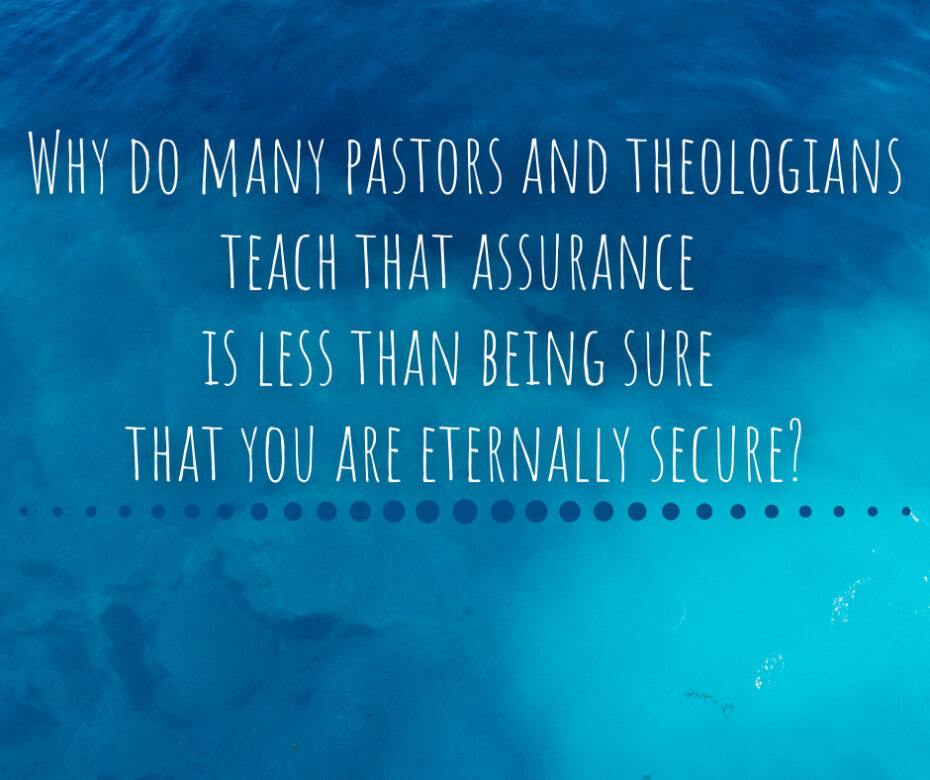It is quite common among people who hold to Lordship Salvation to speak of two types of assurance of everlasting life.
The first kind of assurance is simply called assurance. What is meant by assurance is that one has reason to believe that he may be born again. Typically, the reason for this level-1 assurance involves changes that have taken place in your life.
But, as we all know, our lives are imperfect this side of glory (Rom 3:23; 1 John 1:8 10). Therefore, any changes for the better that I observe in my life are balanced out by the fact that God is not finished with me yet. In fact, believers can backslide.
Any good works we do cannot be quantified. Nor do we have any good way to figure out how much our bad works detract from the supposed assurance we are sensing.
The second type of assurance is called full assurance. What is meant by full assurance is typically that one is as sure as he can be that he is kingdom bound. This level-2 assurance is not certainty. It is just a greater level of confidence that one is born again.
But assurance is not some level of confidence. Assurance is certainty. Even what many call full assurance falls short of Biblical assurance of salvation.
In this two-tiered approach to assurance, where neither is certainty, the desired aim of the preacher is to move his congregation to greater and greater assurance over time. In a 2015 blog, John Piper wonders, “Why has God designed the process of giving us a growing assurance of faith through enduring trials?” You can see the whole article here. Piper cites John Newton: “Newton answers this way: ‘We cannot be safely trusted with assurance till we have that knowledge of the evil and deceitfulness of our hearts, which can be acquired only by painful, repeated experience’ (Newton on the Christian Life, 222).” Note the reference to repeated experience. Piper goes on to explain why “God Grows Assurance This Way.” Assurance. Grows. By. Painful. Repeated. Experience. That is what Lordship Salvation teaches.
Martha was sure that she had everlasting life and would never die spiritually (John 11:25-27). Anyone who believes the promise of everlasting life to the believer is certain that he has everlasting life that can never be lost. The only way to lose assurance is to cease believing the promise of life.
Not all Free Grace people agree that assurance is certainty and that there are no degrees of assurance. Some who identify themselves as Free Grace pastors and authors differentiate between assurance and full assurance. The result is confusion.
Assurance does not grow. Assurance cannot be upgraded to full assurance. Assurance is certainty. At the very moment one is born again, he is certain that he has everlasting life that can never be lost. Why? Because that is what He is believing in Jesus for. He is convinced that Jesus has saved him once and for all.
David Engelsma, himself a five-point Calvinist, laments that many modern Calvinists are like the Puritans. They are on a lifelong quest for assurance. But they never gain what they are seeking. That is why Engelsma calls Puritanism, “a gospel of doubt.”
In a 2014 interview with Shawn Lazar (see here), Engelsma said,
They [Puritans] went wrong by denying that assurance of salvation is of the essence of faith itself. That is the crucial issue. The question is: does assurance belong properly and essentially to faith in Jesus Christ, or is assurance of salvation some element that is lacking in faith, and that God gives to a few believers at a later time, usually by way of answering their hard work?
I maintain in the booklet, and attempt to show from Calvin, the Reformed Confessions, and three Biblical passages, that faith consists of assurance, that it is assurance, and it is not something to either be divorced from faith or added later on.
Assurance is not like leather seats. It is not optional. Assurance is another word for faith. We are justified and regenerated by faith, by being assured that what the Lord Jesus promises He indeed delivers.
Assurance, that is, certainty, produces powerful gratitude in us. As long as we remain assured and thank God for our secure salvation, our gratitude compels us to please our Savior.
If we share the promise of certainty of everlasting life that can never be lost, we typically find that most people think that is crazy. They think that if that were true, then bad people could go to heaven. In their minds, if that were true, people would just go out and sin up a storm. They think that secure salvation is nuts. Working to gain and keep your salvation makes sense to people.
But guess what? When many hear about the promise of everlasting life that Jesus makes to the believer, they are also intrigued. They wonder, could this really be true? They are surprised that you are not telling them that they need to clean up their lives and promise to serve God the rest of their lives.
When you share your faith, tell people that Jesus gives a rock-solid guarantee that whoever believes in Him will not perish but has everlasting life (John 3:16). Do not confuse them and say that Jesus has saved you for now. A person who believes that does not believe the promise of everlasting life. Tell them that the moment they believe in Jesus they are saved forever.


